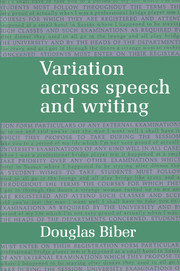Book contents
- Frontmatter
- Contents
- List of figures
- List of tables
- Acknowledgments
- Part I Background concepts and issues
- Part II Methodology
- Part III Dimensions and relations in English
- 6 Textual dimensions in speech and writing
- 7 Textual relations in speech and writing
- 8 Extending the description: variation within genres
- 9 Afterword: applying the model
- Appendix I Texts used in the study
- Appendix II Linguistic features: algorithms and functions
- Appendix III Mean frequency counts of all linguistic features in each genre
- Appendix IV Pearson correlation coefficients for all linguistic features
- References
- Index
8 - Extending the description: variation within genres
Published online by Cambridge University Press: 05 June 2012
- Frontmatter
- Contents
- List of figures
- List of tables
- Acknowledgments
- Part I Background concepts and issues
- Part II Methodology
- Part III Dimensions and relations in English
- 6 Textual dimensions in speech and writing
- 7 Textual relations in speech and writing
- 8 Extending the description: variation within genres
- 9 Afterword: applying the model
- Appendix I Texts used in the study
- Appendix II Linguistic features: algorithms and functions
- Appendix III Mean frequency counts of all linguistic features in each genre
- Appendix IV Pearson correlation coefficients for all linguistic features
- References
- Index
Summary
Genres and text types
Genre categories are determined on the basis of external criteria relating to the speaker's purpose and topic; they are assigned on the basis of use rather than on the basis of form. It is also possible to consider groupings of texts that are derived on the basis of linguistic form. In other work (Biber forthcoming) I distinguish ‘genres’ from ‘text types’: genres characterize texts on the basis of external criteria, while text types represent groupings of texts that are similar in their linguistic form, irrespective of genre. For example, an academic article on Asian history represents formal, academic exposition in terms of the author's purpose, but its linguistic form might be narrative-like and more similar to some types of fiction than to scientific or engineering academic articles. The genre of such a text would be academic exposition, but its text type might be academic narrative.
Genres are not equally coherent in their linguistic characterizations. Some genres have several sub-classes which are quite different from one another; for example, academic prose includes engineering articles, political and historical analyses, and literary discussions. The linguistic form of texts in other genres is simply not highly constrained, and thus these genres permit a relatively wide range of variation; for example, the linguistic characteristics of face-to-face conversation in private academic settings, public social settings, and intimate settings are all different.
- Type
- Chapter
- Information
- Variation across Speech and Writing , pp. 170 - 198Publisher: Cambridge University PressPrint publication year: 1988

